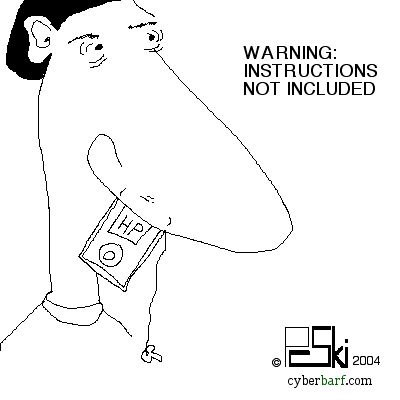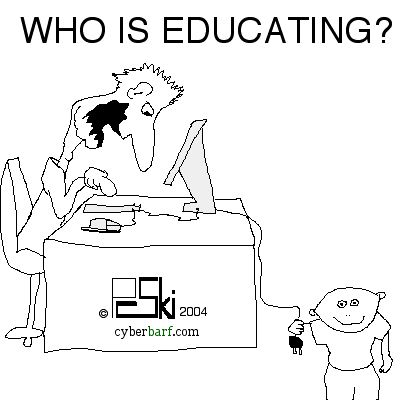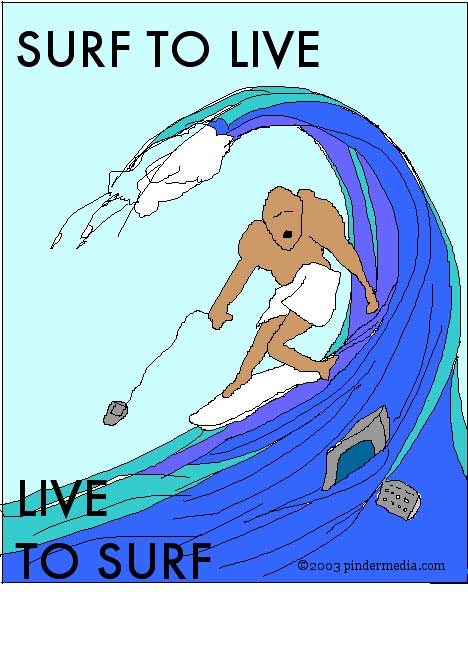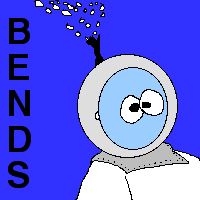cyberbarf
EXAMINE THE NET WAY OF LIFE
Treasure Hunt
Last year, there was the dabble with iMovie. I must have been missing something. It seemed too easy. After creating still images in a paint program, drag and drop pictures and sound effects into the program and within an hour some cynical minute-and-one half piece of satire is finished.
This year, a quick dabble with iTunes. With a limited CD collection on hand, I put in the two albums that get the most play in the old iMac during the creative production hours like off-work web page creation. The contents come up quickly, and creating new libraries are as simple as creating and naming a new folder. Track songs perfectly in order. With the library filled with two CDs from the same artist, being the old college music director, the drag and drop into a new playlist in the order I wanted to hear the songs was the next step. Simple. Then insert a blank CD and press the ominous biohazard icon, instant burn in a few minutes. This was really, really too easy.
Since the first foray was so easy, I decided to check out the older CDs. I got out a double CD re-release from 1996 from an obscure band from the late 1970s. I put in the album into the PB. iTunes came up with the track list. However, it also contained three unnamed tracks. Strange. When I have played this CD in the iMac or a CD stereo player, there were no unnamed tracks. Was it some kind of error? I clicked on the first unnamed track. Shock. A new song played from the artist. I checked the jewel case playlist--- this song is not listed as being on this album! I then click on the other two unnamed songs. Also, two new unlisted songs. Now this is really weird, so weird that I contacted my tech guru, Rocky, who never heard of these buried treasures within an album. How iTunes can extract three songs not listed on the jewel sleeve (though unnamed in the track list) is a mystery. But it has started a new parlor game of trying to find whether the old CDs have other hidden gems. Call it a modern day treasure hunt.
As for the three unheard songs from the album, after putting them into the iTunes library, they were burned on a “best of” CD for this artist. Now I can actually hear those songs when I am typing away on the iMac.
March Madness
As the calendar turns another page, the thoughts of spring begin to heat up. In America, the thoughts that are throwing gasoline on the fire is gambling. The NCAA basketball tournament is the number one office pool. It is the greatest amateur gambling device that hooks in the novice as well as the professional gamer.
It is called March Madness because anything can happen. In the tournament. And in the waging circles. But the uptick in the interest in high stakes gambling is becoming acute. In the late 1990s, high risk gambling was turning Internet flyer stocks on margin into instant wealth. There were stories of trailer housewives calling a broker to place margin bets on four letter initials symbolizing a company they could not even name. The stock market is a bet on what the future price of a stock will be from quarter to quarter, year to year. It used to be an investment, where your capital would return a yield on a consistent basis through the distribution of dividends. The orphans and widows stocks were basic utilities like electric companies that had local monopolies and regulated/consistent profits to be distributed to shareholders. But the Go-Go 90s changed the perception of wealth accumulation. Instead of the long investment marathon, it was the instant gratification of the doubling of non-dividend paying IPO on the first day of trading. The rise of the day trader mentality was the talk around the office cooler and the kitchen table. Millionaires were made overnight.
It is legal gambling. It is legal institutional gambling. It is encouraged by the government because it taxes both ends of the transaction. Government has replaced the local saloon keeper as the nation's organized bookie. Every single American is within three hours drive of a gaming venue. Bingo, horse racing, lottery tickets, or casino gambling. And the government is taking its vigor with each bet.
Illegal organized gambling was an outgrowth of the prohibition era. It was the immoral mental equivalent to the physical disabling immoral drinking binge. The nation was on the cusp of taking its place as the leader of the industrial world; sober, hard work and educated men were the virtues of bettering society. Anything that would sidetrack the American worker was discouraged as being an evil influence.
The intrusion into the morality of an individual's entertainment made it even more glamorous, dangerous. It made prohibition drinking and gambling to rise. The black market also made the bootleggers and bookies very very rich. And the American dream of opportunity can only be ledgered by how rich you become in your field.
States have taken the backroom gambling into the sunlight. States license all forms of gambling in the hopes of generating more revenue to spend on the legislative pork projects. It is getting so addictively greedy that the State of Illinois is thinking of owning its last riverboat casino license. In effect, regulating its own casino. The last of the moralists and law enforcement officials could be heard having a collective thunderclap of the palm of their hands striking their foreheads in dismay.
The States are actually in fierce competition against the illegal gambling. The NCAA bracket pools are a prime example of how a few friends drawing teams among themselves for a sawbuck equates to millions of co-workers collectively betting a billion dollars on the tourney games. That is a billion dollars of wagers that are not being taxed as revenue to the States. It is less money going to buy scratch off or a quick pick Lotto ticket.
For purists, the moral question on gambling is a lost cause. Once the States became players and instigators in public gambling games, the criminal intent of prohibition statutes intellectually has been watered down. The States are encouraging gambling because gambling generates state revenue. However, the Feds still have their prohibition statutes that they still enforce; the wire fraud acts are still used to stop the interstate traffic of illegal gambling. The law has been upheld in cases when a person dials up to an off-shore casino to place bets. Since the person is using the telephone wires to make or place a bet, it is no different than calling Al Capone and placing a dime on your favorite team. So the conflict of interest is apparent.
So pulling out 64 teams from a hat is still considered an illegal activity even though the majority of persons now perceive the act as a harmless form of entertainment. Instead of watching six crime shows depicting violent crimes in graphic detail, the casual bettor is watching basketball games. No harm, no foul, right? A long time ago in college, we had our own special pool. We had pre-proposition proposition bets to even out the risk of the random draw of 16th seeds. We had the Indiana bounty; if your team beat Bobby Knight's squad you got a bonus. We had the Slaughter rule; if your team got the worst beating in the tournament, a rout, the worst defeat, you got a bonus. Those bets made the tournament even more interesting.
If you had enough proposition bets tailored into your bracketology, is it really luck anymore? Certain forms of gambling are considered games of skill. California treats poker as a game of skill and not pure gambling even though money is bet. But the essence of all gambling is betting on the future outcome of an event; just like picking stocks with a dartboard. Some things are good, and some things are evil. Some places it is legal; other places it is illegal. Now that's the madness of March. It should be one or other but not both.
The Non-Computer Hack
In the frenzy of the million song Pepsi giveaway of iTunes, the premise was simple, old fashioned marketing: one in three cola bottle caps would have the winning iTunes code. Get the code and dial into the Apple music store to redeem a 99 cent credit in your account toward purchasing a song or album. The promotion was wrapped up in the theme song, “I Fought the Law and the Law One,” in reference to the legal downloading of music instead of the prior questionable peer to peer file sharing.
But give a few people with plenty of time to think of ways around the system, this image was rocking across the Net and into email boxes across the world:
Instead of hacking a computer, hackers/slackers/whomever hacked the Pepsi iTune contest without screwing off a single bottlecap. When there is a will there is a way. With all the previous bottlecap promotions, who ever heard of the tipping the bottle to reveal the prize code? It just goes to show you how valuable the prize is to many people--- music downloads are wanted bad, bad enough to find a way to instantaneous win at no cost. Pepsi may have to rethink the I Fought the Law concept next time around.
AVAILABLE AT THE CYBERBARF eSTORE:
Get Ready for the Summer Now!!!!New Real News merchandise!!!!
SUPPORT THIS SITE at the eStore.
The Next DTP
Got no life? iLife!
Within the first few weeks of Apple's new iLife suite of programs, there has been a flood of exchanging people's first GarageBand songs. From the early reviews, GarageBand is an addictive program that allows a novice to create their own musical scores. This is not the first time technology has placed an average guy on par with a specialist.
Before the personal computer, those who wanted the mathematical power of computing had to lurk around the universities with their stacks of IBM punchcards and wait for time to run their programs to see if they would actually work. Writers and engineers still used the paper and pencil tools of their trade to create their work.
Then the Mac came along with programs like MacWrite and MacPaint that got creative persons to see how the paper and pencil world could be fashioned on-screen then printed on a dot-matrix finished product. It matured into a utility that most of us take for granted today. Typewriters are antiques in offices today. CAD programs have taken the place of the rows of draftsman's tables.
It also empowered individuals to become their own publishing centers. Instead of taking typewritten pages to the local copyshop to create a company or organization's newsletter, desk top publishing software allowed people to cut out the middle man. Printer technology advancements made the need for small print shop owners obsolete. The darkroom went digital so even photographs could be placed into DTP.
When the desk top publishing revolution first took off, it was well known that there were an enormous amount of bad looking, confusing and ugly publications being distributed by the general public. What would one expect? Giving a person with no basic understanding of art composition a paint brush, that person will not become Michaelango overnight. People were addicted to the concept of having multiple fonts--- on the same page--- in the same story; not because it made any sense, but because they could do it. Just do it; we have heard that line before for many new adventures. As a classically trained journalist, the homestead library still contains a 1977 Cincinnati Enquirer design stylebook which was the cutting edge of newspaper modular design for its time.
Now, the process was repeated again. But this time when the Web took off. The ease of uploading web sites by anyone with a modem connection and simple webhost page program took the bad DTP era to a universally gagging period. It took a while for the design cues to make their way into functioning web page design standards. One cannot fault the novice web page designer plunging deeply into the new technology because most had a message that they wanted to publish to the world.
Now, the process of getting one's message across is being repeated again with the GarageBand mania that will swell and curl like a nice break at Big Sur. Be prepared for the musical attachments in each Monday's email from friends or colleagues. Apparently, the early converts praise the ease of song construction in the software; the drag and drop technology and internal tempo editor makes palatable tunes. It is like those addictive simulator games; the hours just fly by as you reach new levels of progress. Mixing instrumental loops into different patterns --- whether being a closet DJ; a dreaming rock star; or the classic re-mix master record producer --- will propel this fad into another creative force de jour. Artists and the artistically inclined can now render their own creations instead of listening just to others hit their muse.
It will take several years of the nubie artist class to create multilayered songs like vintage Supertramp. Giving the other options for someone to let loose their pent-up creative aggression, let them loop to their hearts content.
Bends & Trends
The first curse a child has in this word is being named by his or her parents. Instead of naming his son Junior or the Second or the Roman numeral II, a techie decided to name his child 2.0. Like after an updated software version. Children should be named not branded by code numbers.
T-shirts, Caps, Mugs. Check for Specials!
Your support keeps this Site moving forward. Thank you!
Distribution ©2001-2004 pindermedia.com, inc.
All Rights Reserved Worldwide.
Contact Information
Terms and Conditions
Trademarks
Archives









